How Mamia is empowering māmā and whānau
By MAS Team
Frustrated by the lack of support for new Māori mothers and the many roadblocks of the health system, Dr Aria Graham developed Mamia – a special place for māmā, pēpi and whānau.
When Dr Aria Graham describes the physical space, the wraparound care and the wairua of Mamia, it’s as if her not-for-profit initiative in Waipatu, Hastings, is a person. A woman, to be more exact. A māmā herself, perhaps – someone who embodies love and kindness, nurturing and nourishment.
“She’s had a lovely fresh coat of paint, we’ve opened her doors to let the air and the sunshine in, and she’s just taken off!” begins Aria (Ngāti Kahungunu, Ngāti Porou, Samoan).
Situated within Waipatu Marae, a series of upcycled sheds and containers (some of which have been moved off the Te Aute property Aria shares with her husband, Dr James Graham) make up Mamia, a place for mothers and babies to come and to be. They might arrive for a chat and some kai, a movement class or health seminar, or to hand their baby over and go for a sleep.
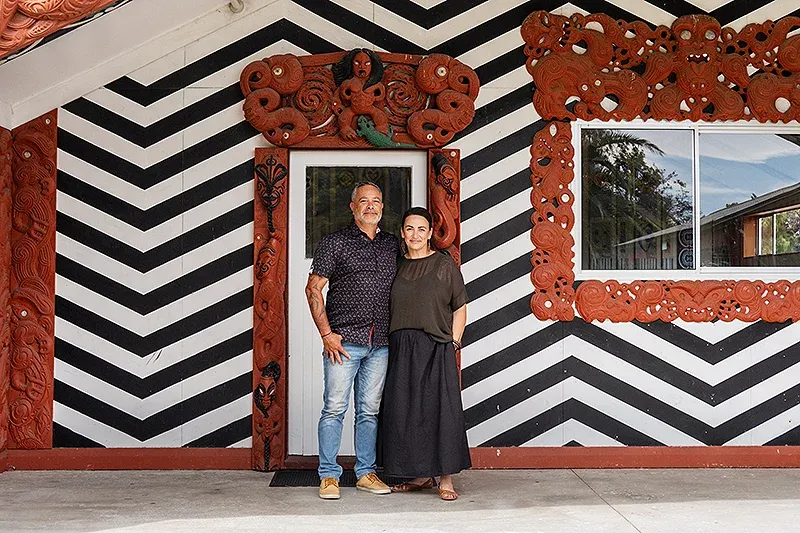
“The idea was to create a living area as well as a place to eat together, because often that’s where connections and great conversations happen, while you fill your belly with something shared and nutritious. There’s always a pot on the stove, there’s a place to shower and take a nap, and plenty of aunties and nannies around to look after pēpi so māmā can have a rest,” explains Aria.
“Some of the wāhine who come to Mamia are living in emergency housing, in challenging and complex situations, or will come in saying, ‘I’m just so tired that I can’t think straight.’ We’re here for them, to give them the respite that they need in that moment.”
Aria has a PhD thesis focused on maternal wellbeing using kaupapa Māori methodology, which informs her work at Mamia. She also has a nursing background and has seen first-hand the struggles some māmā experience when their ‘village’ is in disarray, and the subsequent impact on tamariki.
Further challenges arise, she says, when a child is neurodivergent or cognitively or behaviourally impacted. Aria’s idea was to create a service and place, within Mamia, for whānau to go to for support through kōrero, guidance and whānau-centred tools. With James, who holds a PhD in Māori education, Tākuta Tamaiti was developed, supported by MAS Foundation.
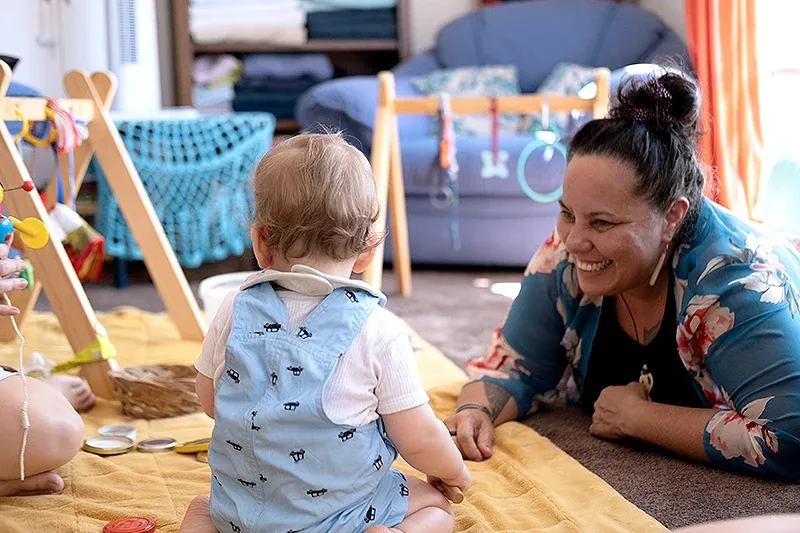
“Many of our ara – our pathways – are associated with the birth journey, or are in the postnatal and early years space,” explains James (Ngāti Kahungunu, Ngai Te Whatuiāpiti). “But Tākuta Tamaiti is a culturally-grounded child development initiative bringing together a child health specialist and our Māori world view to support whānau.”
With a paediatrician and cultural therapist as part of Mamia’s 12 kaimahi (staff) and ama (volunteers), whānau are able to bring children aged 0-5 to Mamia for a kōrero with their specialist team. “There’s a conversation, along with suggestions, strategies and support delivered in real time,” James says.
Paediatric referrals within the current healthcare model are often hard to come by, with long waiting times to be seen. Aria says Tākuta Tamaiti fills a much-needed gap, and it’s a service that aligns strongly with the values of MAS Foundation.
“MAS Foundation immediately understood the constraints of the current health system and saw the merit of this kaupapa,” says Aria. “They also allowed us to utilise our frameworks – frameworks we’ve developed in response to the needs of whānau, letting them lead. The way we are able to work in accordance with tikanga is majorly beneficial and we’re very grateful for that ability.”
With sessions held weekly on Mondays, and parents able to self-refer, Aria says there’s enormous value in the work being delivered by MAS Foundation-funded paediatrician Dr Eve Fifield and cultural therapist Erena Tomoana – work she hopes will continue beyond the scope of the initial funding.
“We hear often that Mamia is a home away from home for our māmā, that they’ve been listened to and our team has given great support,” says Aria. “Feedback like that makes me feel so happy, but also relieved.
“There’s a lot of money poured into punitive measures by those at the top, but really, we should listen more closely to our whānau and what they need so we can get upstream of these issues, trip them up, and break the cycle for our tamariki.”
Because, she says, it’s working – and Mamia, that special and nurturing wahine on the marae in Waipatu, is ready to embrace whatever’s next. “We’re just trying to keep pace with Mamia, be respectful to her and remain authentic to what her intention is.”
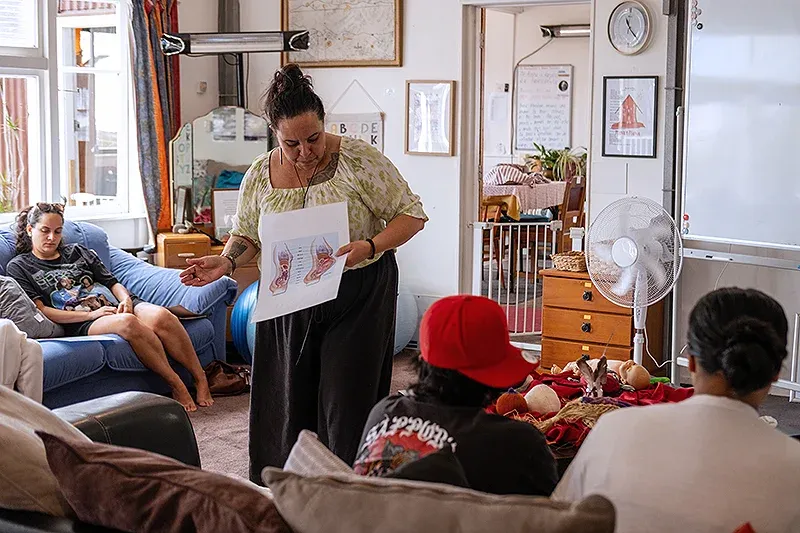
Dr Julie Wharewera-Mika (Head of Foundation) says, “When whānau are trusted to lead with their own mātauranga, meaningful solutions like Mamia can grow, grounded in tikanga, shaped by aroha and responsive to the needs of the community. Supporting marae-based, community-led Māori initiatives is more than providing services; it’s about backing the strength and wisdom of people. It’s a step toward a future where tamariki are raised in the embrace of their culture, surrounded by whānau and supported to thrive.”
Mafi Funaki-Tahifote (Head of Foundation) adds, “Mamia is an exemplar of a flourishing community when communities lead and steer their own solutions. This aligns very closely with the Foundation’s value ‘tika, pono me te aroha’, which embraces the Samoan proverb ‘E fofō e le alamea le alamea’ (Let the issues within the communities be resolved by those in the communities), recognising solutions are within communities.”
Head to the MAS Foundation grants page to read about the organisations that benefit from their support.
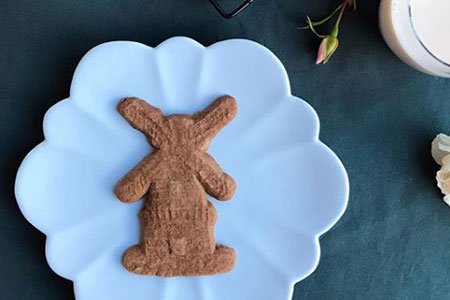
Final year medical student Jessica Tsang was abruptly called back from her elective study in Sweden at the start of March as the COVID-19 crisis intensified across the globe – so she's brought a taste of Sweden back to New Zealand.

The Christchurch mosque attacks have inspired two Afghan-Kiwis to help others.
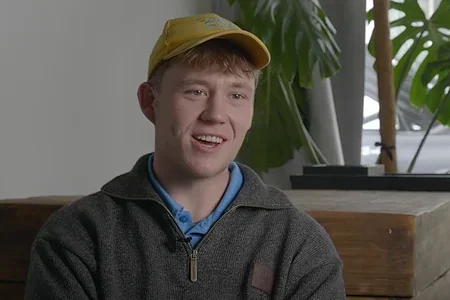
We chatted with a young entrepreneur, Oakley Inkersell, who turned a part-time gig into a budding business empire.